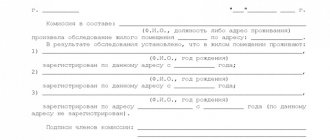6
The heir has the right to actually accept the inheritance. That is, they continue to use the apartment or land even after the death of a close relative, ensure the safety of objects, and pay bills. Paperwork takes place later. For example, when there is a need to sell or exchange property. If there is insufficient evidence of actual inheritance, the issue will have to be resolved through the court. Let's look at how the fact of accepting an inheritance is established in court.
What is actual acceptance of inheritance?
One of the ways to enter into an inheritance is in fact. That is, when the heir continues to use the property of the deceased citizen, he bears the costs of its maintenance.
Naturally, these facts must be confirmed by relevant documents. Otherwise, the notary will not issue a certificate of inheritance. Actions indicating the actual acceptance of property must be carried out within 6 months after the death of the owner.
Important! An heir who uses part of the property is considered to have accepted the entire property of the testator.
The heir can go to court at the location of the asset being used. As for the rest of the property, it will need to be found. You can claim your rights after identifying the property.
Why do you need a court decision?
The official scheme for accepting an inheritance involves the applicant applying to a notary. Late submission of documents excludes the possibility of entering into rights without a court decision. An exception is the acceptance of inheritance after the fact. However, this method of inheritance only postpones the moment of visiting the notary’s office, but does not exclude it.
The beneficiary will need to visit a notary and provide conclusive evidence of actual ownership. There are no deadlines for submitting papers. But it is better to act within the statute of limitations. If you have 2nd or 3rd line relatives, it is advisable to go to court within the time limit for registering an inheritance.
Expert opinion
Stanislav Evseev
Lawyer. Experience 12 years. Specialization: civil, family, inheritance law.
If the applicant turned to a notary, but was unable to provide evidence of acceptance of the property within 6 months , then he will be refused to issue a certificate. The refusal must contain a regulatory justification and be exclusively in writing. After receiving the document, the applicant will have to go to court to secure his rights to the inherited property.
Without a court decision, it will not be possible to register ownership. In essence, a procedural document replaces a notarial certificate.
How to enter into an inheritance after the fact?
Actual taking of ownership implies physical possession of a specific object. For example, the heir must live in the apartment at the time of the testator’s death or move into it immediately after his death.
If the applicant uses part of the property that belonged to the deceased citizen, then he is considered to have accepted all the property - including obligations, debts, etc.
Do I need to contact a notary?
Mere use of property is not enough. Before becoming the new owner of the deceased's assets, the heir must obtain inheritance rights. In order to enter into an inheritance in fact, you will have to contact a notary.
Please note that the actual acceptance of the inheritance only requires the issuance of a certificate of inheritance. The applicant must provide evidence of ownership, management, maintenance or security of the property.
Based on the evidence, the notary establishes the fact of acceptance of the inheritance. If no questions arise, the heir will receive a certificate and will be able to register the property with Rosreestr, the Federal Tax Service or the State Traffic Safety Inspectorate.
Contacting a notary is a right, not an obligation of the heir. However, if you do not contact a notary, you may encounter legal difficulties. For example, proof of real ownership of property after the death of the testator. Disputes are resolved in court, which, as you understand, is not very beneficial to the heirs.
Procedure
So, the heir decides to accept the property of the deceased after the fact.
Algorithm of actions:
- Decide on the composition of the property.
- Carry out any action of actual acceptance of property (see above).
- Prepare evidence of the actual acceptance of the inheritance mass.
- Contact the notary at the place where the inheritance was opened, provide evidence, and pay the state fee for issuing the certificate.
- Wait until the 6 month period has expired.
- Receive a certificate of the right to inheritance - with the seal and signature of a notary.
- Complete the registration of property rights with the Rosreestr authority.
Whether or not to contact a notary is at the discretion of the heirs. Lawyers recommend taking advantage of this opportunity, even if you are sure that only you will get the property.
Evidence of actual acceptance of inheritance
Actual acceptance of assets and provision of proper facts are not the same thing. The heir must provide written and oral evidence of this fact.
Otherwise, the notary will refuse to issue a certificate of inheritance. Then the applicant will be able to exercise his right only through the court. However, here, too, documents will be required that substantiate the plaintiff’s claims.
What papers can be used as evidence? A notary is guided in his activities by the law and methodological recommendations.
The courts take into account the instructions of the Resolution of the Plenum of the Armed Forces of the Russian Federation No. 9. Therefore, when preparing the evidence base, it is advisable to familiarize yourself with the provisions of legal acts.
List of documents confirming acceptance of inheritance:
- Russian Federation passport - page with the citizen’s registration;
- certificate from the Housing Office - the document confirms cohabitation with the testator;
- bank documents on payment of utilities, taxes, fees, repayment of loan debt - both paper receipts and online printouts of checks with the bank’s seal are suitable;
- an agreement with a contractor to carry out repair work in the apartment of a deceased person;
- an agreement on the transfer of property for free use (not to be confused with a lease, since ownership has not yet been formalized);
- papers confirming the demand for money from third parties (for example, a court ruling on the claim of an heir);
- testimony of witnesses - friends, neighbors, creditors, workers, etc.
These actions must be carried out within 6 months after the death of the previous owner of the assets. In other words, the heirs prove that they took actions aimed at accepting the property. If they paid the electricity debt one-time in the interests of the testator, this does not speak in favor of the actual acceptance of the inheritance.
Claim or special proceedings
Options for legal proceedings in cases of acceptance of inheritance:
- Claim proceedings are used in the event of disputes between heirs. If other potential recipients wish to receive a share in the property or challenge the applicant’s rights to the inherited property, then the application must be submitted through the claim procedure.
- Special proceedings are applied in the absence of other applicants. If a citizen goes to court to officially confirm his rights to inheritance, the issue will be resolved through special legal proceedings.
What should the application contain?
So, for the case to proceed, it is necessary to indicate the following facts in the application:
- Information about the plaintiff and his contact details;
- Indicate the reasons for the appeal;
- Indicate the reasons for going to court - the notary’s refusal and your own actions or expenses in relation to the property;
- An indication of family ties and other characteristics;
- Request to establish the fact of inheritance.
Note: according to the law, property can be claimed not only by a blood relative, but also by a dependent who has proven this fact or by the acquirer of inheritance rights who has performed the appropriate actions in accordance with the procedure of acquisitive prescription.
All documents that would confirm relationship, legality of claims, receipts, etc. should be attached to the application. The following can be used as evidence:
- Title documents for property;
- Receipts for expenses incurred;
- Expert opinions confirming the improvement in the condition of the property;
- Photos and video materials of repair work;
- Official correspondence with government authorities;
- Testimony of witnesses.
In the absence of other claimants or actions on their part in relation to the property, such evidence is quite sufficient.
Who can go to court
The initiator of the trial may be:
- actual heir.
- creditor of the testator.
However, sometimes successors are in no hurry to visit a notary or go to court. The reasons may be different:
- lack of funds for inheritance registration;
- lack of reasons for registration during the actual use of the property;
- presence of significant loan debt.
In the third case, the applicants will have to repay the debts of the testator. Refusal of inheritance will lead to the transfer of property to next-line relatives or the state. Citizens choose the tactic of inaction.
In such a situation, the creditor can go to court. The successor is considered to have entered into the inheritance if he has taken actions indicating the actual acceptance of the assets.
How to establish the fact of acceptance of inheritance in court
To establish the fact of acceptance of the property, it is necessary to submit a corresponding application . The form of the document must comply with the requirements of the Code of Civil Procedure of the Russian Federation.
Documents confirming the claims are attached to the application. Additionally, the plaintiff must pay a state fee. Its size depends on the claims.
The court hearing takes place with the participation of the plaintiff, defendants, and other interested parties. Witnesses can be brought in if necessary.
Based on the results of the trial, a decision is made whether to refuse or satisfy the claims. A court decision in favor of the plaintiff will allow him to formalize ownership and obtain title papers.
If the application was initially filed as part of a special proceeding, but in court it turns out that there are other claimants to the testator’s property, then the application is left without consideration. At the same time, the court must explain to the plaintiff his right to file an application within the framework of the claim proceedings.
Procedure, procedure
The plaintiff's action algorithm:
- Preparation of documents.
- Filing an application or claim.
- Participation in legal proceedings.
- Providing all necessary evidence.
- Participation in judicial debates.
- Obtaining a court decision.
If the court rejects the claims, the plaintiff can appeal the decision through the appeal procedure. 1 month to prepare your complaint . The countdown begins from the moment the court decision is announced.
The decision in favor of the plaintiff can be appealed by the participants in the trial. If the appeal is not received within 1 month , then the court decision gains force. After which the heir can register ownership.
Application to establish the fact of acceptance of inheritance
When drawing up a claim, you must adhere to the requirements of Article 131 of the Code of Civil Procedure of the Russian Federation. The document must contain:
- name of the district or city court;
- information about the applicant/respondent (residence address, full name);
- the essence of the violated right;
- circumstances that justify the plaintiff’s position;
- evidence of claims;
- cost of claim;
- a link to pre-trial settlement of the issue;
- list of attached papers;
- date, signature of the plaintiff.
Sample statement of claim to establish the fact of acceptance of inheritance
If the application is submitted as a special proceeding, then it is additionally necessary to indicate why the establishment of the fact is required (Article 267 of the Code of Civil Procedure of the Russian Federation).
Attached documents
When filing a claim, one of the basic requirements is the availability of evidence. The plaintiff must not only justify his claims orally, but also attach documents confirming his words.
Appendix to the statement of claim:
- copy of the claim;
- plaintiff's identity card;
- evidence of the death of the testator;
- certificate from the place of registration of the testator/heir;
- papers indicating the relationship of the applicant and the deceased citizen;
- documents confirming the ownership of the deceased person;
- technical papers on movable/immovable property;
- evidence of acceptance of inheritance in fact;
- documentary refusal of the notary;
- report on the value of the inheritance;
- proof of payment of the fee.
When filing a claim by an attorney, you will additionally need a notarized power of attorney. If the claim is filed by legal representatives, then they need to attach papers confirming the relationship with the minor child or the corresponding decision of the guardianship authority.
Evidence of acceptance of inheritance
Judicial practice has long been established on this issue. Separate explanations are contained in the Methodological Recommendations for Notaries.
Evidence base on actual acceptance of inheritance
| No. | Type of evidence | Documentation |
| 1 | Evidence of residence or occupancy of the deceased citizen’s apartment | Testimony of witnesses, extract from the house register, certificate of registration at the place of residence |
| 2 | Evidence of ensuring the safety of residential premises | Agreement on installing an alarm system in the premises |
| 3 | Evidence of repair work | Receipts for the purchase of building materials, acts of acceptance of work performed, contract agreements |
| 4 | Collection of debts from debtors of the deceased | Court ruling on the commencement of legal proceedings on a claim for debt collection from third parties |
| 5 | Evidence of payment of utility debts | Checks, personal account statements |
| 6 | Payment of debts of the deceased | Bank receipt for full or partial repayment of the loan |
| 7 | Evidence of use of a garage or plot of land | Certificate from a housing or dacha cooperative |
The list of documents is not exhaustive. The heir may use additional evidence that indicates the actual acceptance of the testator's property.
The only condition is that the evidence used must coincide with the period allotted for entering into inheritance (Article 1154 of the Civil Code of the Russian Federation).
Requirements for the documents provided:
- must contain outgoing numbers;
- date of compilation;
- seals of organizations;
- signatures of responsible persons;
- seals of authorities.
Additionally, you can use the testimony of neighbors or acquaintances who are ready to confirm the actual acceptance of the inheritance and the disposition of the property.
State duty
If the application contains a requirement to settle a property dispute, then the payment amount is calculated based on the value of the property. To determine it, you need to take a certificate from the BTI and/or order an assessment from a specialized organization.
When calculating the fee amount, 2 factors are taken into account:
- minimum amount of duty;
- percentage of the excess amount.
If the heir is entitled to benefits, he must provide supporting documents. Consequently, the plaintiff is exempted from paying the tax in whole or in part.
If an application of a non-property nature is submitted, then the amount of the state duty is 300 rubles. (Article 333.19 of the Tax Code of the Russian Federation).
Comparing the costs of notarizing an inheritance and recognizing property rights through the court, it becomes obvious that it is much cheaper to contact a notary.
How does judicial evidence work?
To prove the fact of a family relationship, birth and marriage certificates, passports, archival certificates, etc. must be attached to the application. If documentation of relationship is completely missing, circumstantial evidence may be presented or witnesses may be called. To prove the fact of acceptance of inheritance, you can use:
- title documents for real estate, transport and movable property confirming ownership of the deceased owner;
- documents confirming the incurrence of expenses for management, operation, current and major repairs of property - contracts, checks, receipts, estimates, etc.;
- photo and video materials confirming the use of property;
- an expert’s opinion on improvements made at the applicant’s expense after the death of the owner;
- testimony of witnesses (neighbors in the area or house, other persons);
- official correspondence with state and municipal authorities confirming due care for the safety of property from encroachment by other persons.
If other persons do not claim distribution of property after the death of a relative, the specified evidence will be sufficient for the court to make a decision. However, a dispute may arise when the heirs of the first or subsequent stages, who timely submitted an application to the notary, will claim the seizure of property from the actual owner. In this case, the court will evaluate the inheritance rights of all participants in the process. If this dispute arises, the burden of proof will be assigned to persons who do not agree with confirmation of the fact of actual acceptance of the inheritance.
If the court evaluates the presented arguments and evidence and grants the application, the following consequences occur:
- a judicial act will be the basis for applying to a notary and obtaining a certificate of inheritance (if the property actually accepted constitutes only part of the assets of the deceased, the size of the share will be indicated in the certificate);
- upon receipt of the certificate, the citizen will have to pay a fee according to the standard rules of the Civil Code of the Russian Federation (for example, if there is a close relationship with the deceased, the fee will be 0.3% of the value of the property, but not more than 100 thousand rubles);
- rights to real estate and motor vehicles must be re-registered in the departments of Rosreestr and the State Traffic Safety Inspectorate - for this, a notarial certificate is presented and a fee is paid.
If the fact of a family relationship has already been confirmed in court proceedings, the notary is not obliged to repeatedly request similar documents. When issuing a certificate, only property actually accepted by the citizen is taken into account (other assets of the deceased not received by the applicant will not be included in the certificate). Therefore, within the framework of inheritance proceedings, part of the property can be transferred on the basis of a certificate, and the other part - according to a judicial act.
Having confirmed the right to inherited assets and registered ownership, a citizen will be able not only to use the property, but also to dispose of it - rent, sell, give, exchange, etc. If a certificate or judicial act has not been received for the property actually accepted, legal disposal will be impossible.
Deadlines
An heir can file an application with the court at any time. However, it is better not to delay the process. Otherwise, the right of inheritance may arise for other persons.
The period for consideration of a claim in civil proceedings is 2 months. However, in practice, the hearing of the case can take much longer.
The duration of the proceedings is influenced by many factors:
- participation of representatives;
- calling witnesses;
- the need for an examination;
- illness or business trip of the participants in the process;
- increase in the volume of claims;
- judge's vacation.
Establishing the fact of acceptance of inheritance by the testator
Inadequate paperwork or postponing this issue is a problem for many citizens. Therefore, heirs periodically have to not only prove their rights to property, but also justify how the property came to be in the possession of the testator.
One of such cases is the actual acceptance of an inheritance. That is, when one of the relatives died, and the heir did not contact the notary in a timely manner, but continued to use the property.
Example. After the death of the mother, an inheritance in the form of a private house was opened. The deceased woman's daughter took over the property. She lived with her mother and son, so she did not contact a notary. However, a year later the woman died. The only heir was her 20-year-old son. The young man actually accepted the property. After the deadline for contacting a notary had expired, the heir wanted to move to live in the city. The housing issue could be resolved by selling the house. To complete the paperwork, the young man turned to a notary. It turned out that the heir’s mother had not entered into her rights properly. The notary advised the young man to go to court.
In this case, the heir will need to prove the fact that his mother took over the property after his grandmother, continued to use the house, pay electricity bills, pay land tax, etc. etc.
Judicial practice: decisions to establish the fact of acceptance of inheritance
The lack of adequate evidence in the event of actual acceptance of the inheritance is the reason for going to court. In 2021, judicial practice on such issues has long been formed.
Example. Citizen R. applied to the court to establish the fact of acceptance of the inheritance. In 1990, she and her husband received housing as young doctors. In 1995, they privatized the house and land. He died in 2002. The woman did not formalize the inheritance, since she continued to live in the house, cultivated the land and considered this property to be hers. In 2021, she decided to sell the house. It turned out that she is the owner of ½ share of the house and land. Since she was the owner of the share, the notary did not count her actions as the actual acceptance of the inherited property. Therefore, citizen R. asks the court to establish the fact of actual acceptance of the inheritance.
The court satisfied the claims. The fact of acceptance of the inheritance was confirmed during the court hearing. However, if there is such a judicial act, the heir will have to contact a notary. Because the issue of recognition of property rights was not considered.
If there are other applicants, the heir will have to file a claim for recognition of ownership. After receiving a court decision, the heir can immediately contact Rosreestr and register ownership.
Grounds for recognition as successor
Of course, in order to become the actual owner of an inheritance, it is necessary that certain features be observed. Not in every situation is it possible to become an heir in this way, without having to report to the notary and other owners.
- So, the first basis is the fact that the heir took possession of the property that belonged to the testator by right of ownership. For example, immediately after the death of the testator, he took over his car and carried out maintenance, repair and maintenance of the car.
- The second basis is the adoption of measures aimed at preserving this property and improving its qualities. For example, placing this car in a garage so that weather conditions do not in any way lead to a deterioration in the appearance of the property.
- The third reason is maintaining the property in the best possible condition, as well as spending money on such actions. For example, the heir uses the land, however, he repaired the fence, laid paths, and loosened the ground.
- The fourth reason is related to possible expenses that were aimed at maintaining real estate. For example, using an apartment for living and at the same time paying all debts on utility bills from the testator.
- The last reason is living in an apartment or in a built house, which belonged to the testator by right of ownership at the time when immediate death occurred.
- Another important reason that you should pay attention to is the absence of a claim to receive an inheritance from third parties, as well as other heirs. This means that besides you there should not be any persons who also lay claim to this property, while having a similar right by law or by will.
We talked in more detail about the grounds for entering into an inheritance here.





